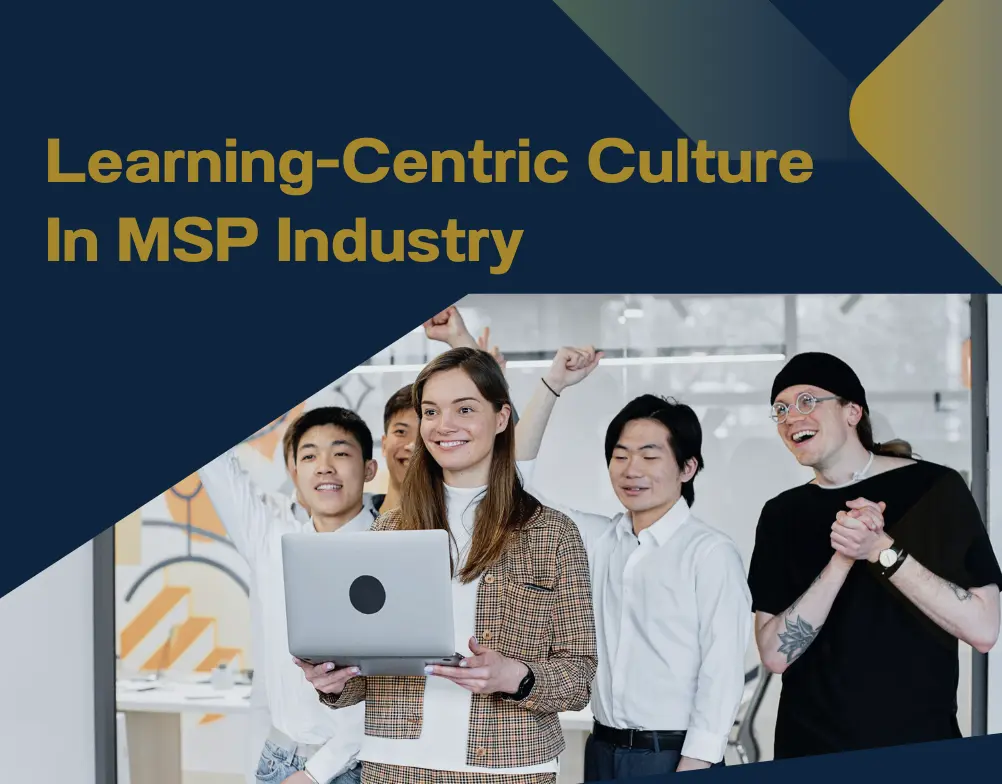Today’s Managed Service landscape requires more than just cutting-edge technology and impeccable service delivery to stay ahead. The key to sustainable MSP growth lies in fostering a learning-centric culture within your company. By prioritizing continuous learning and development, MSPs can enhance their capabilities, innovate effectively, and maintain a competitive edge. This article explores how leaders and employees can cultivate a learning-centric culture to drive MSP growth and success.
Understanding the Importance of a Learning-Centric Culture
The Role of Continuous Learning in MSPs
Continuous learning is essential for MSPs due to the fast-paced nature of the IT industry. New technologies, security threats, and regulatory changes are constantly emerging. By promoting a culture of continuous learning, MSPs ensure their teams are always equipped with the latest knowledge and skills. This adaptability not only improves service quality but also builds client trust.
Benefits of a Learning-Centric Culture
- Enhanced Employee Engagement: Employees who are encouraged to learn and grow feel more valued and satisfied in their roles. This leads to higher retention rates and attracts top talent.
- Improved Innovation: A culture that fosters learning promotes creative thinking and problem-solving. Teams are more likely to develop innovative solutions that can set the MSP apart from competitors.
- Increased Efficiency and Productivity: Well-trained employees can perform tasks more efficiently and effectively, reducing downtime and increasing overall productivity.
- Better Client Relationships: Knowledgeable employees can provide superior service and support, leading to stronger, more trusting relationships with clients.
Strategies to Foster a Learning-Centric Culture
Leadership Commitment
For a learning-centric culture to thrive, it must be championed by the leadership team. Leaders should demonstrate their commitment to continuous learning by participating in training programs and encouraging their teams to do the same. This sets a positive example and reinforces the importance of learning within the organization.
Providing Learning Opportunities
MSPs should offer a variety of learning opportunities to cater to different learning styles and preferences. These can include:
- Formal Training Programs: Structured courses and certifications relevant to the MSP industry.
- Workshops and Seminars: Interactive sessions that provide hands-on learning experiences.
- Online Learning Platforms: Access to a wide range of courses that employees can complete at their own pace.
- Mentorship Programs: Pairing less experienced employees with seasoned professionals for guidance and knowledge sharing.
Encouraging Knowledge Sharing
Promoting a culture of knowledge sharing is crucial for continuous learning. MSPs can implement the following practices:
- Regular Team Meetings: Encourage team members to share what they’ve learned from recent training or projects.
- Internal Knowledge Base: Create a repository where employees can document and access best practices, troubleshooting tips, and other valuable information.
- Cross-Training: Allow employees to learn about different roles within the organization to broaden their skill sets and improve overall team versatility.
Rewarding Learning and Development
Recognizing and rewarding employees for their learning efforts reinforces the importance of continuous improvement. MSPs can implement reward systems such as:
- Certification Bonuses: Financial incentives for employees who earn relevant certifications.
- Career Advancement: Promotions and role expansions for those who consistently demonstrate a commitment to learning.
- Public Recognition: Acknowledging learning achievements in company meetings or newsletters to highlight the value placed on continuous education.
Overcoming Challenges in Building a Learning-Centric Culture
Resistance to Change
Some employees may be resistant to the idea of continuous learning, especially if they are accustomed to traditional work environments. MSPs can address this by:
- Communicating Benefits Clearly: Explain how continuous learning can lead to personal and professional growth.
- Providing Support: Offer resources and time for learning to reduce the perceived burden on employees.
Balancing Learning and Work
Finding the right balance between learning and daily responsibilities can be challenging. MSPs can help by:
- Integrating Learning into Workflows: Incorporate short learning sessions into regular work routines.
- Flexible Scheduling: Allow employees to set aside dedicated time for learning without impacting their work performance.
Conclusion
Cultivating a learning-centric culture is essential for sustained MSP growth and success. By prioritizing continuous learning, MSPs can enhance employee engagement, drive innovation, improve efficiency, and strengthen client relationships. Implementing strategies such as leadership commitment, providing diverse learning opportunities, encouraging knowledge sharing, and rewarding development can overcome challenges and create an environment where learning thrives. In a competitive industry, MSPs that embrace a learning-centric culture will be well-equipped to navigate changes and seize new opportunities. As an MSP advisor, I work with managed services to build and implement strategies that improve sales, operation, and team growth. Get in touch with me today to learn about how I can help uplevel your MSP.



